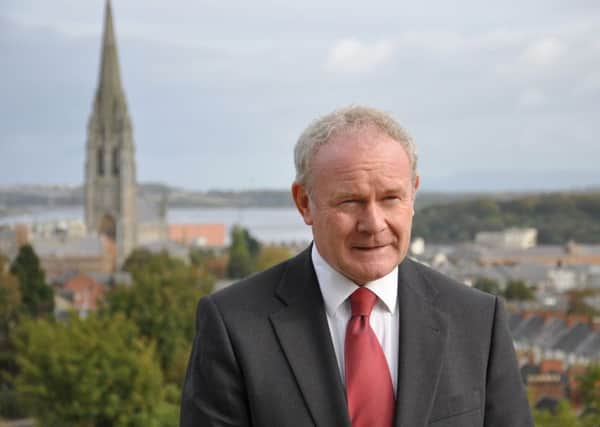RHI Scandal: Foster should step aside - McGuinness


the strength of feeling over the Renewable Heating Incentive scandal and step aside.
Mr McGuinness said the coming year would require “mature leadership” from unionism during 2017, while warning that the crisis triggered after it emerged that the flawed scheme will cost the public purse in the region £490m was “growing”.
Advertisement
Hide AdAdvertisement
Hide AdIn his New Year’s message, the Sinn Féin Foyle MLA said that there was now a need for “real leadership if confidence is to be restored in the political institutions in 2017”.
Mr McGuinness said: “There is also no doubt that we are facing a serious growing political crisis in the North as public confidence in the political institutions has been grievously undermined by the Renewable Heat Incentive (RHI) debacle and the DUP’s failure to deal responsibly and adequately with it.
“In order to address these challenges the DUP and its leader Arlene Foster need to accept there is an overwhelming desire in the community to deal with this issue and for Arlene Foster to step aside as First Minister pending a preliminary report.
“That would allow for an independent investigation to take place, which is transparent, robust, time-framed and led by an independent judicial figure from outside this jurisdiction appointed by the Attorney General. A rigorous process to recoup as much of the money as possible must also be put in place.
Advertisement
Hide AdAdvertisement
Hide Ad“We need to restore public confidence in the credibility of the political institutions, ensuring they deliver for the people.”
Speaking on other matters, Mr McGuinness said the result of the Brexit Referendum had “potentially very damaging consequences for the entire island of Ireland”.
“Sinn Féin has made it repeatedly clear that the vote of the majority of people in the North to remain in the EU should be respected and that we are committed to securing designated special status for the north within the EU,” he said, adding:
“This means giving substance to what citizens, north and south, endorsed in referendums almost 20 years ago and in the Good Friday Agreement which both the Irish and British governments have the responsibility to see implemented.
Advertisement
Hide AdAdvertisement
Hide Ad“This is set out in international treaty; that is equality of treatment, parity of esteem and mutual respect.
“Political and civic leaders in the north must play their part in this. My leadership on this is well documented and is a matter of public record.
“There needs to be respect for all political allegiances and traditions on this island, for all narratives. The Irish language, Irish identity, culture and aspiration are as valid as any other and need to be respected as such.
“The political principles agreed to this end and the political infrastructure created to bring this about are not being used for these purposes.
Advertisement
Hide AdAdvertisement
Hide Ad“This must change. Our society should have no fear of equality, reconciliation and peaceful co-existence. On the contrary most people desire it, require it.
“That will require mature leadership from political unionism because we alone cannot deliver reconciliation.”
Mr McGuinness said there was also an “onus” on the British government to “step up to the plate on the vexed issue of dealing with the legacy of the past”.
He accused the government of holding up legacy inquests and denying justice to victims and their families in the process.
Advertisement
Hide AdAdvertisement
Hide Ad“2017 will no doubt be a year of challenges and there is a clear need for real leadership if public confidence is to be restored in the political institutions in the days and weeks ahead,” he said.
Mr McGuinness said that over the course of 2016, many milestones have been reached on the path to a new Ireland, and “an agreed Ireland”, including celebrating the centenary of the 1916 Easter Rising “with great pride, dignity and respect”, as well as the centenary of key events during World War One.